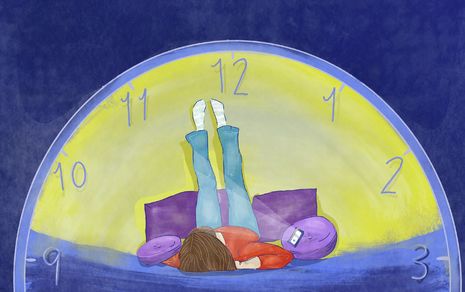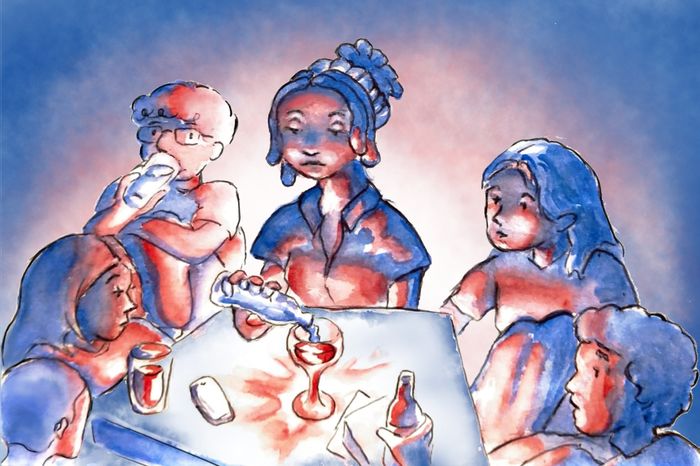Should you miss your 9am lecture?
Milena Aarts makes the case against going for the sake of a few extra hours of sleep

The dreaded ring of the alarm you set only four hours ago after returning from Wednesday Revs may be familiar to many of you. In that groggy state of sleep paired with a splitting headache, you might wonder whether you should do the ‘right’ thing and go to your 9am, or sleep for a few more precious hours. The odd all-nighter might not do too much harm, but research suggests that sleep deprivation, whether a result of Cambridge’s wonderful night life or too many late nights spent at the library, may impair your cognitive performance.
It will come as no surprise that lack of sleep affects your ability to pay attention. A study by David Dinges split participants into groups that slept zero, four, six and eight hours and recorded the number of times they failed to respond to a stimulus. This ‘lapse’ of attention was attributed to microsleeps, experienced by individuals that are chronically sleep-deprived, during which the participant starts to close their eyes and their senses are temporarily paralysed.
“Repeatedly missing out on those eight hours will leave you zoning out for days to come”
Interestingly, the results showed that the reaction times of individuals that had slept six hours each night for ten days were as impaired as those who had not slept for 24 hours straight. Even after three nights of recovery sleep, their performance did not return to the baseline established by their performance after eight hours of sleep every night. Therefore, repeatedly missing out on those eight hours may leave you drifting to sleep at the back of the lecture theatre, or zoning out for days to come.
Lack of sleep may also impair your ability to consolidate knowledge into your long-term memory. This was shown in a study led by Matthew Walker which asked a group of well-slept individuals and a group of sleep-deprived individuals to learn new facts. After both groups received two nights of good sleep, they were both given a test based on the taught facts and it was found that the performance of the sleep-deprived group was 19% lower. Furthermore, MRI scans, which allow localised brain activity to be visualised, showed that in the sleep-deprived group there was no significant learning activity found in the hippocampus, which is the part of the brain where new memories are stored.
“A lack of sleep leads to poor decision-making and a difficulty to balance strong emotions”
Sleep deprivation may not only impair your ability to learn new information but may also affect your ability to consolidate information from the previous day. In a study by Robert Stickgold at Harvard University, both well-slept and sleep-deprived participants were led through a visual memory task. The results showed that individuals who hadn’t slept showed no improvement in memory consolidation unlike the well-slept participants. So, if you feel like everything goes in one ear and out the other, it might be worthwhile to sleep a little longer.
Do you often feel like you’ve gotten out of the wrong side of bed? Research also suggests that a lack of sleep can make you more prone to mood swings. During sleep, the pre-frontal cortex – responsible for logical reasoning and decision-making – inhibits another part of the brain called the amygdala, which processes strong negative emotions. Without sleep, the amygdala shows over a 60% amplification in emotional reactivity. Additionally, the striatum – responsible for reward processing – becomes hyperactive. Without sleep, the regulation of the emotion centres in the brain are disrupted, potentially leading to poor decision-making and a difficulty to balance strong emotions. Perhaps your supervision partner wasn’t more annoying than usual, and you ought to do the question sheets before 2am.
A lack of sleep leads to attention deficits, a struggle to stick things to memory and difficulty regulating emotions – a recipe for disaster. So, instead of going to your 9am, not taking a word in and napping all afternoon, in the long run it might actually prove worthwhile to have a lie in.
 News / Colleges charge different rents for the same Castle Street accommodation2 March 2026
News / Colleges charge different rents for the same Castle Street accommodation2 March 2026 News / News in Brief: waterworks, wine woes, and workplace wins 1 March 2026
News / News in Brief: waterworks, wine woes, and workplace wins 1 March 2026 News / Climate activists protest for ‘ethical careers policy’1 March 2026
News / Climate activists protest for ‘ethical careers policy’1 March 2026 News / Private school teacher who lied about Cambridge degree barred from teaching27 February 2026
News / Private school teacher who lied about Cambridge degree barred from teaching27 February 2026 News / Angela Merkel among Cambridge honorary degree nominees27 February 2026
News / Angela Merkel among Cambridge honorary degree nominees27 February 2026









